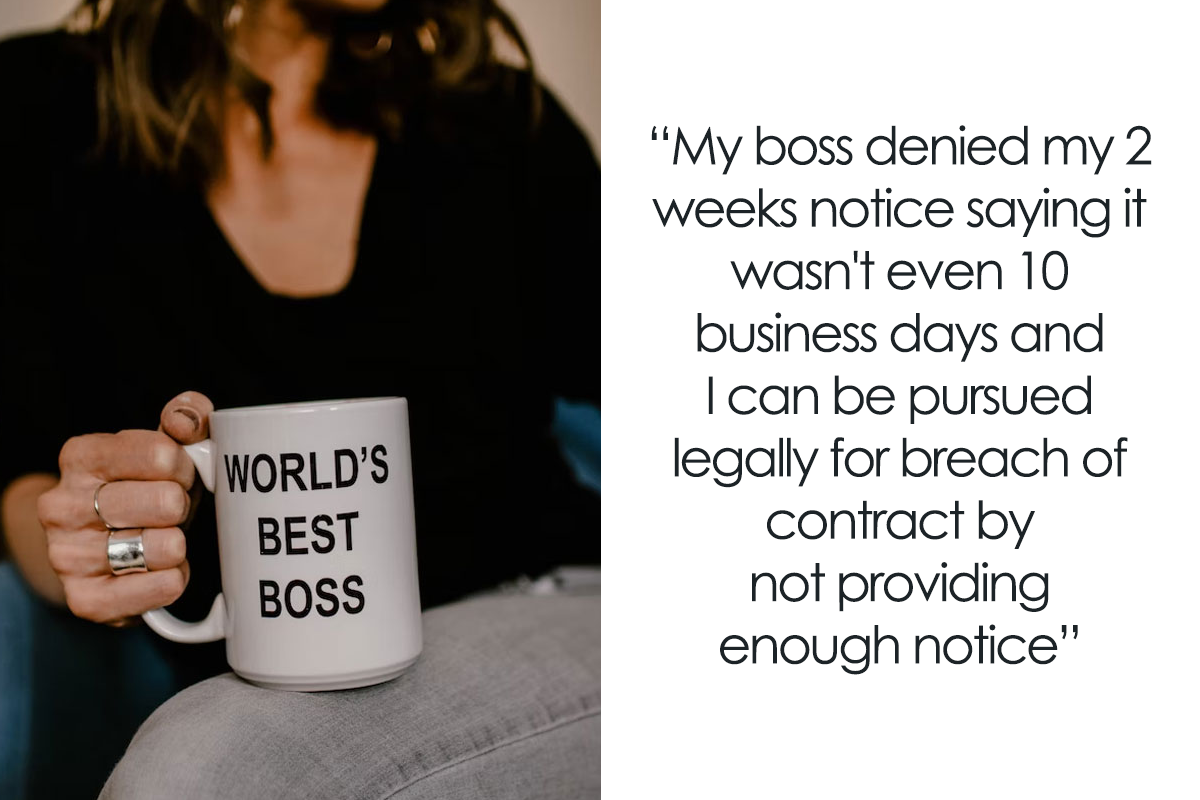
Employee Gets Accused Of Trying To Sabotage The Company By Handing In 2 Weeks’ Notice Right Before The Holidays
The standard rule of thumb for most jobs is that when it’s time to move onto something else, it’s polite to give your employer two weeks’ notice before leaving. This 14-day timeline is not written in stone, and in certain cases, employees might provide more notice to help their team out or less notice to escape a particularly hostile workplace. But two weeks is usually the magic number.
One employee, however, recently reached out to the Antiwork subreddit with concerns about their boss denying their two weeks’ notice request. They’ve been told they must give 4-8 weeks notice instead, so they’ve taken to the internet to ask if this arbitrary timeline can actually be enforced. Below, you can read the employee’s full explanation, as well as some of the replies readers have left to try to help them out, and then let us know in the comments how you feel about this situation.
Have you ever left a job with more or less than two weeks’ notice? Feel free to share your personal experiences with your fellow pandas in the comments, and then if you’re interested in checking out another Bored Panda article highlighting that handing in your notice doesn’t always go as planned, you can find that right here!
After their two weeks’ notice was rejected, this employee sought advice online to see if their boss could legally require them to work longer
Image credits: Kelly Sikkema (not the actual photo)
Image credits: Scott Graham (not the actual photo)
Image credits: CaterpillarWeak893
Invested readers had lots of questions, so the employee later clarified more details in the replies
This employee noted in their post that they live in Canada, so we did a bit of research to find out what exactly an employee’s rights are in Canada. According to About Staffing, a staffing agency in Calgary, it’s actually not a requirement to even provide two weeks’s notice. It is considered a courteous gesture, as it often takes at least a few weeks to hire a new employee and learn how to adjust to having one less worker, but no, this employer cannot force their staff to come in after the two weeks that they have notified management of are up.
What is required by common law in Canada is giving an employer “reasonable notice”. “Two weeks’ notice is the norm, but under common law, this is not an expressly required amount of time,” About Staffing explains on their site. “Your version of a reasonable amount of time might be less than or more than two weeks notice. The purpose of this is to allow your employer to have enough time to find a replacement to fill your role. This is required of you, whether or not there is an employment contract in place.”
A boss is also not allowed to prevent any employee from quitting if that is what they desire. “While they may try to convince you or bully you into staying, they cannot legally prevent you from leaving the position,” About Staffing notes. “However, if you have signed a contract, you will want to take a look at that and ensure that you did not agree to work a specific number of days or through specific calendar dates.”
In the case of this employee on Reddit, as far as we know, they are legally allowed to leave after the two weeks’ notice that they submitted. It is likely that their employer just started panicking about being understaffed around the holidays and decided to use fear as a desperate attempt to get the employee to stay. According to Robert Half Talent Solutions, it is common for a manager to request that their employee stay longer than two weeks after they’ve decided to leave, but it is a request not a demand.
“While employees may legally be free to walk away within two weeks of giving notice, [employers] need time to delegate duties and recruit a suitable replacement,” Robert Half explains. “In this case, you can negotiate with employees to extend their tenure at your organization. Clearly, you’ll want to do this as soon as possible. Also, remember that they’re free to decline your request.”
We’ve reached out to this employee on Reddit, so hopefully we will be receiving an update on the situation soon, but as of now, I’m just hoping that they don’t feel bullied into staying any longer at a job they hate. There are too many toxic employers out there, and they’re never going to learn their lesson if they keep steamrolling workers into doing whatever they want all the time. We would love to hear your thoughts on this situation in the comments, pandas, and if you’ve ever been pressured into staying past your two weeks’ notice, feel free to share how you handled that conflict. Then if you’re interested in reading another Bored Panda article featuring employers who did not take a worker’s resignation well, you can find that right here!
But one thing everyone agreed on is that the employee cannot be forced to stick around past their two weeks
I'm old and retired now, but when I was in the working world (here in Canada), you generally gave the amount of notice of your pay period. If you got paid weekly, you gave a week's notice. If you got paid every two weeks, that's the notice you gave, and so on and so forth.
Standard in the UK is pay period, or more if agreed mutually by contract (which includes offer letter, terms and conditions, and anything else you sign directly related to you starting work). In my industry 3 months is common, with 6 months for more senior staff.
Load More Replies...Maybe things are different in Canada than in The States, but: 1) An offer letter is not a legally binding contract. 2) You are an employee, not an indentured servant. 3) It's not your fault that they didn't hire enough people to keep the business operating without you.
Actually, in Canada, the letter of offer is the contract of employment. Two copies are made, both signed by hiring manager, both signed by the new employee, and the office keeps one copy, employee keeps the other. Here the letter of offer outlines salary, expectations, benefits, company pension contributions/entitlement, notice period, etc. By signing the offer, you are agreeing to the terms set out in the offer. HOWEVER no one actually pursues legal action against someone who quits without notice either, it just means you cannot collect employment insurance (depending on the circumstances for why you quit without notice, we have a lot of employee protections in Canada 😁) But your listed #'s 2 and 3 are 100% fact.
Load More Replies...I'm old and retired now, but when I was in the working world (here in Canada), you generally gave the amount of notice of your pay period. If you got paid weekly, you gave a week's notice. If you got paid every two weeks, that's the notice you gave, and so on and so forth.
Standard in the UK is pay period, or more if agreed mutually by contract (which includes offer letter, terms and conditions, and anything else you sign directly related to you starting work). In my industry 3 months is common, with 6 months for more senior staff.
Load More Replies...Maybe things are different in Canada than in The States, but: 1) An offer letter is not a legally binding contract. 2) You are an employee, not an indentured servant. 3) It's not your fault that they didn't hire enough people to keep the business operating without you.
Actually, in Canada, the letter of offer is the contract of employment. Two copies are made, both signed by hiring manager, both signed by the new employee, and the office keeps one copy, employee keeps the other. Here the letter of offer outlines salary, expectations, benefits, company pension contributions/entitlement, notice period, etc. By signing the offer, you are agreeing to the terms set out in the offer. HOWEVER no one actually pursues legal action against someone who quits without notice either, it just means you cannot collect employment insurance (depending on the circumstances for why you quit without notice, we have a lot of employee protections in Canada 😁) But your listed #'s 2 and 3 are 100% fact.
Load More Replies...
 Dark Mode
Dark Mode 

 No fees, cancel anytime
No fees, cancel anytime 















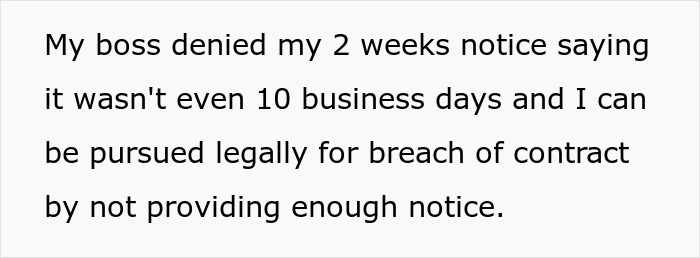
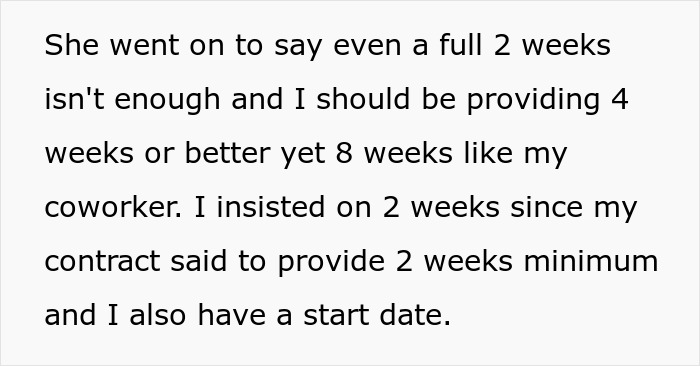

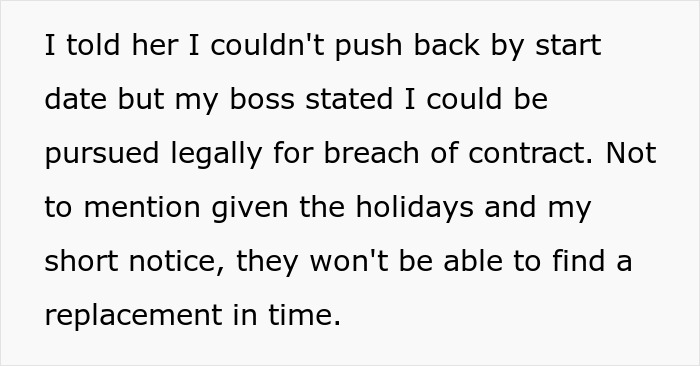

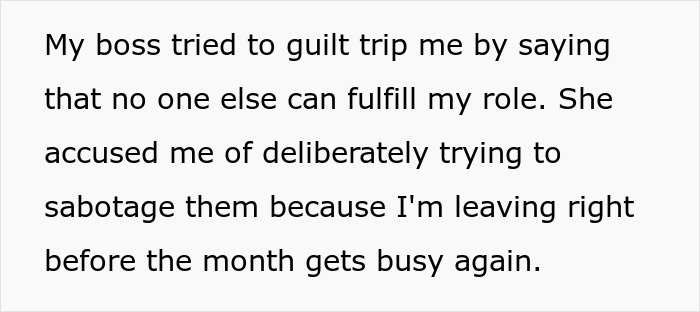
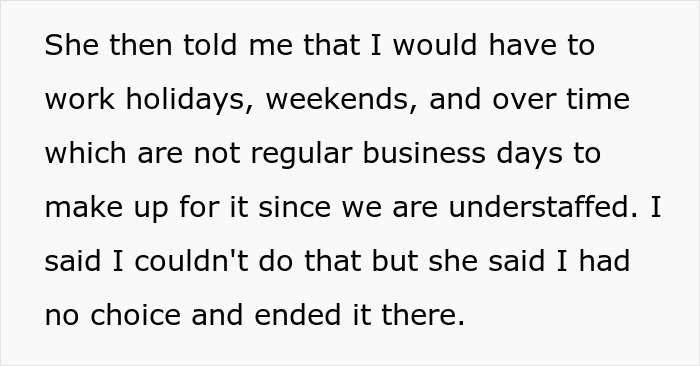


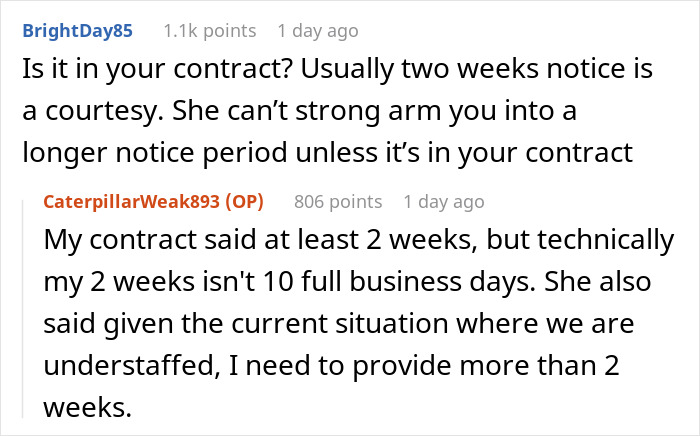
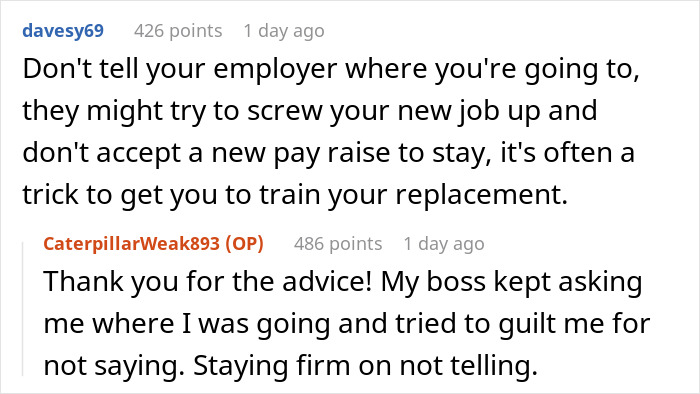
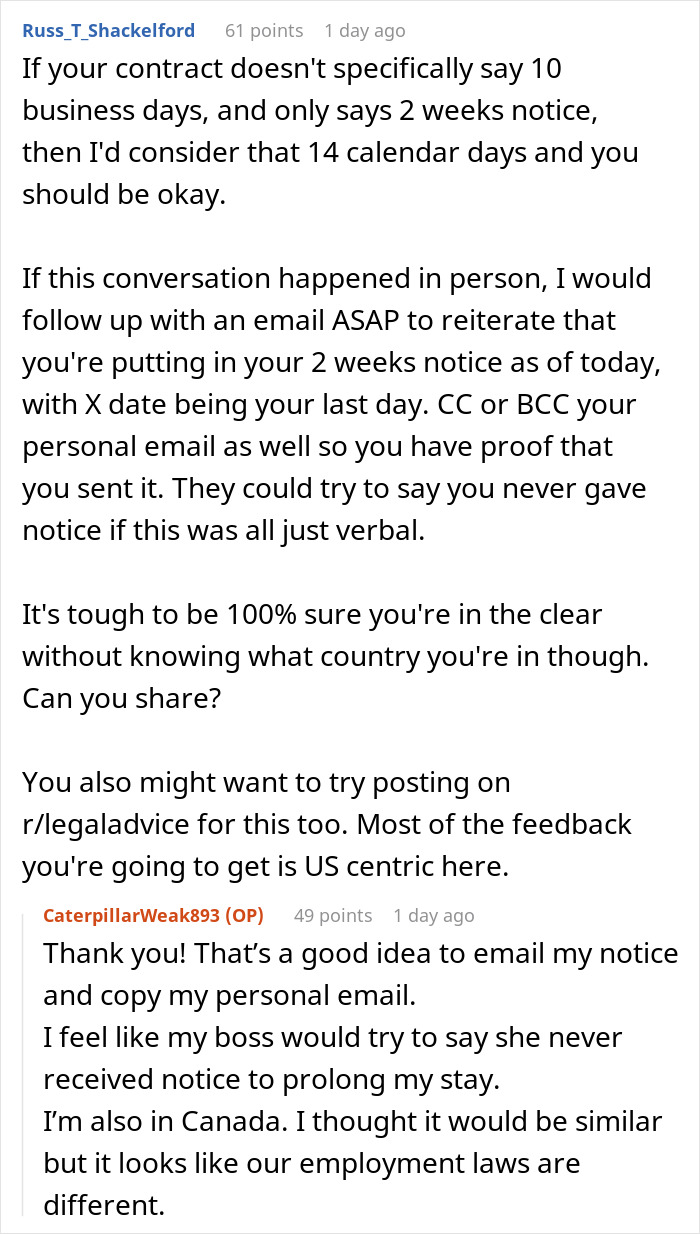
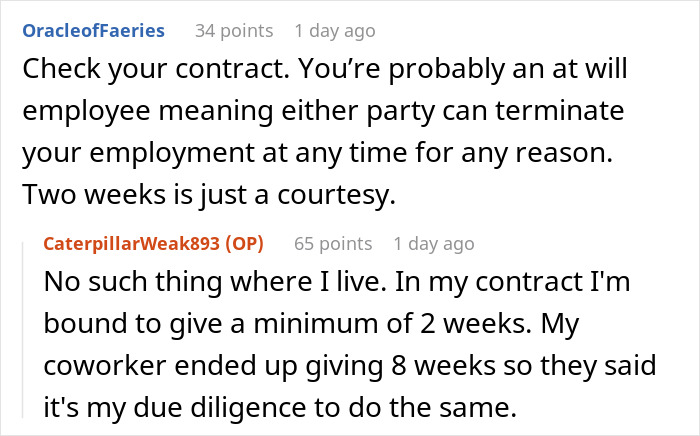
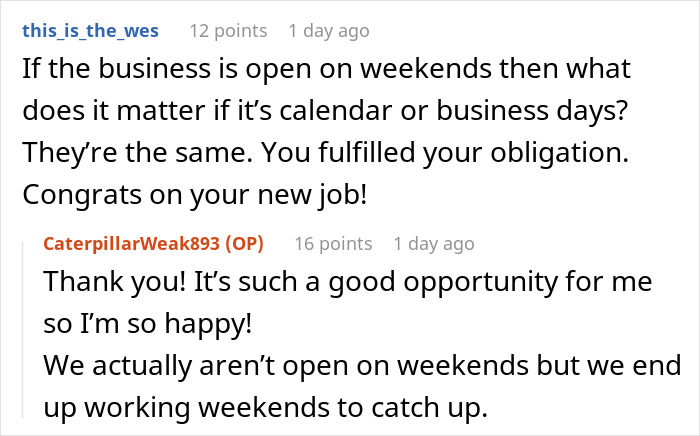
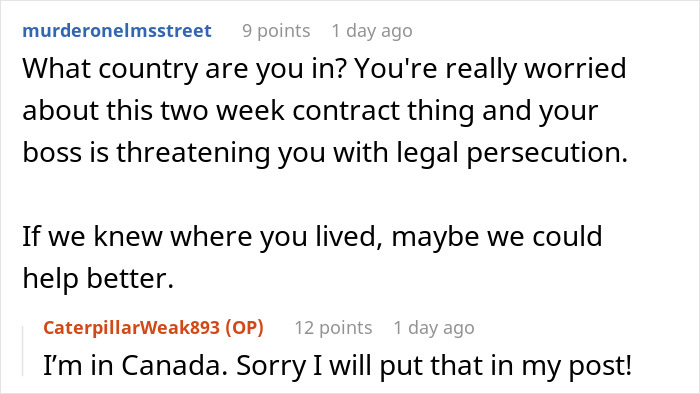
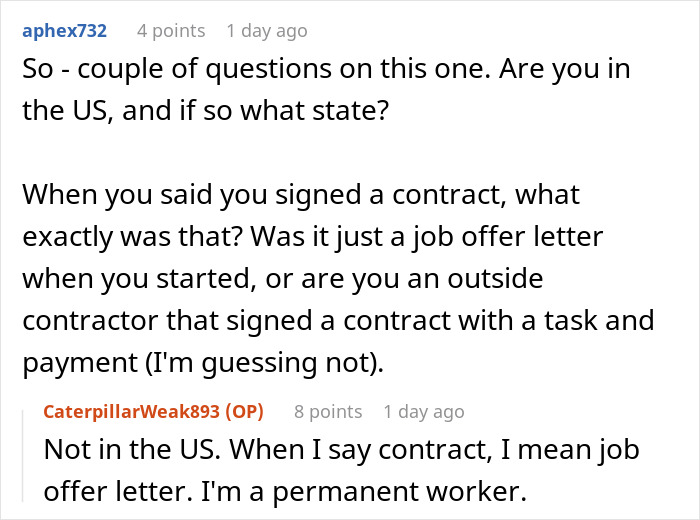
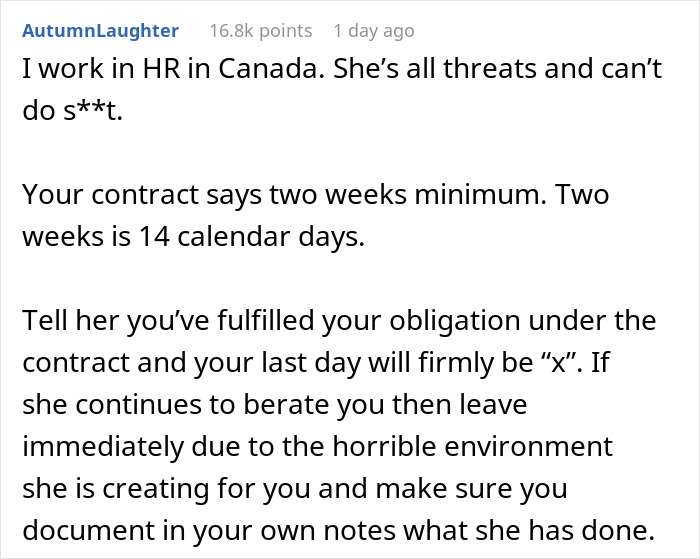
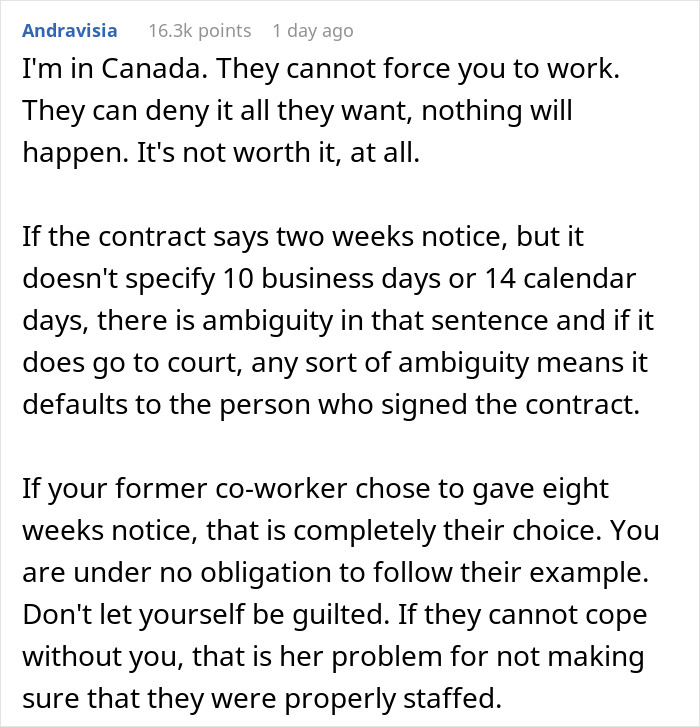

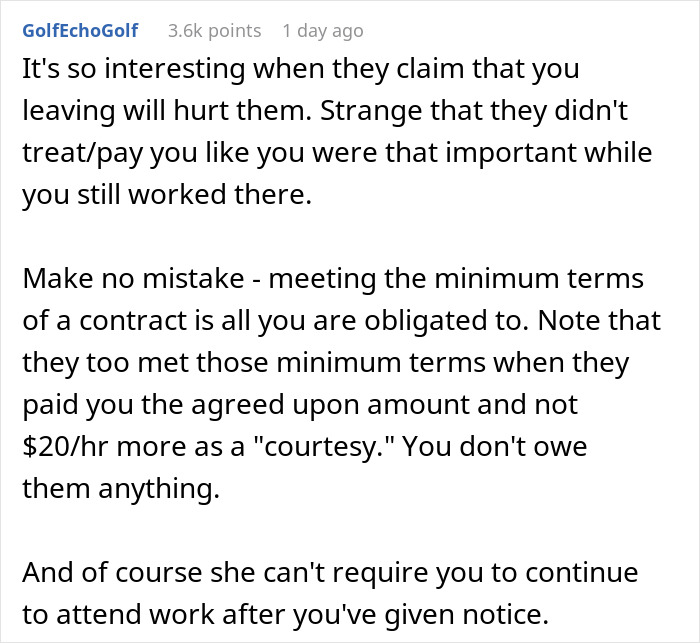
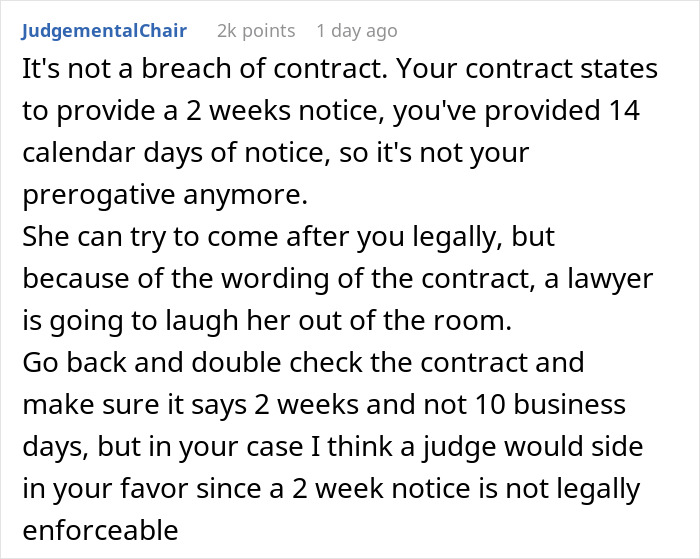




























![“[Am I The Jerk] For Telling My Mom That It Was Very Obvious They Never Liked Me?”](https://www.boredpanda.com/blog/wp-content/uploads/2024/12/mom-relationship-drama-coverimage.jpg)
76
61